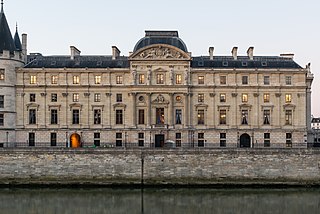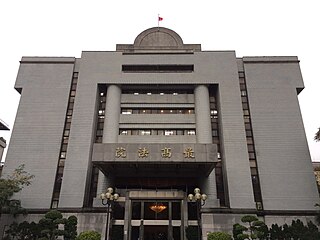Related Research Articles

United States appellate procedure involves the rules and regulations for filing appeals in state courts and federal courts. The nature of an appeal can vary greatly depending on the type of case and the rules of the court in the jurisdiction where the case was prosecuted. There are many types of standard of review for appeals, such as de novo and abuse of discretion. However, most appeals begin when a party files a petition for review to a higher court for the purpose of overturning the lower court's decision.
A plea bargain is an agreement in criminal law proceedings, whereby the prosecutor provides a concession to the defendant in exchange for a plea of guilt or nolo contendere. This may mean that the defendant will plead guilty to a less serious charge, or to one of the several charges, in return for the dismissal of other charges; or it may mean that the defendant will plead guilty to the original criminal charge in return for a more lenient sentence.
In law, certiorari is a court process to seek judicial review of a decision of a lower court or government agency. Certiorari comes from the name of an English prerogative writ, issued by a superior court to direct that the record of the lower court be sent to the superior court for review. The term is Latin for "to be made certain", and comes from the opening line of such writs, which traditionally began with the Latin words "Certiorari volumus...".

The Court of Cassation is the supreme court for civil and criminal cases in France. It is one of the country's four apex courts, along with the Council of State, the Constitutional Council and the Jurisdictional Disputes Tribunal.

The Judicial Yuan is the judicial branch of the government of Taiwan. It runs a Constitutional Court and oversees all systems of courts of Taiwan, including ordinary courts like the supreme court, high courts, district courts as well as special courts like administrative courts and disciplinary courts. By Taiwanese law, the Judicial Yuan holds the following powers:
A writ of coram nobis is a legal order allowing a court to correct its original judgment upon discovery of a fundamental error that did not appear in the records of the original judgment's proceedings and that would have prevented the judgment from being pronounced. The term coram nobis is Latin for "before us" and the meaning of its full form, quae coram nobis resident, is "which [things] remain in our presence". The writ of coram nobis originated in the courts of common law in the English legal system during the sixteenth century.
In law, the standard of review is the amount of deference given by one court in reviewing a decision of a lower court or tribunal. A low standard of review means that the decision under review will be varied or overturned if the reviewing court considers there is any error at all in the lower court's decision. A high standard of review means that deference is accorded to the decision under review, so that it will not be disturbed just because the reviewing court might have decided the matter differently; it will be varied only if the higher court considers the decision to have obvious error. The standard of review may be set by statute or precedent. In the United States, "standard of review" also has a separate meaning concerning the level of deference the judiciary gives to Congress when ruling on the constitutionality of legislation.

The High Court of Singapore is the lower division of the Supreme Court of Singapore, the upper division being the Court of Appeal. The High Court consists of the chief justice and the judges of the High Court. Judicial Commissioners are often appointed to assist with the Court's caseload. There are two specialist commercial courts, the Admiralty Court and the Intellectual Property Court, and a number of judges are designated to hear arbitration-related matters. In 2015, the Singapore International Commercial Court was established as part of the Supreme Court of Singapore, and is a division of the High Court. The other divisions of the high court are the General Division, the Appellate Division, and the Family Division. The seat of the High Court is the Supreme Court Building.

The Supreme Court of Cassation is the highest court of appeal or court of last resort in Italy. It has its seat in the Palace of Justice, Rome.

The Court of Cassation of Belgium is the supreme court of the Belgian judiciary. The court is composed of thirty judges with life tenure who are nominated by the High Council of Justice of Belgium and appointed by the Belgian federal government. The court handles cases in the two main languages of Belgium, Dutch and French, and provides certain facilities for cases in German. The court is assisted in its work by a public prosecutor's office and a bar association, which both function separately from other structures. The duty of the public prosecutor's office is to provide advisory opinions to the court on how the law ought to be interpreted and applied. The attorneys of the court's bar association assist litigants in proceedings before the court; in certain cases, their assistance is mandatory.
The legal system of South Korea is a civil law system that has its basis in the Constitution of the Republic of Korea. The Court Organization Act, which was passed into law on 26 September 1949, officially created a three-tiered, independent judicial system. The revised Constitution of 1987 codified judicial independence in Article 103, which states that, "Judges rule independently according to their conscience and in conformity with the Constitution and the law." The 1987 rewrite also established the Constitutional Court, the first time that South Korea had an active body for constitutional review.

The Montana Supreme Court is the highest court of the state court system in the U.S. state of Montana. It is established and its powers defined by Article VII of the 1972 Montana Constitution. It is primarily an appellate court which reviews civil and criminal decisions of Montana's trial courts of general jurisdiction and certain specialized legislative courts, only having original jurisdiction in a limited number of actions. The court's Chief Justice and six Associate Justices are elected by non-partisan, popular elections. The Montana Supreme Court meets in the Joseph P. Mazurek Building in Helena, Montana, the state's capital, an international style building completed in 1982 and named in the honor of former Montana Attorney General, Joseph P. Mazurek.

The Supreme Court of the Republic of China is the court of last resort in the Republic of China (Taiwan), except matters regarding interpretation of the Constitution and unifying the interpretation of laws and orders which are decided by the Constitutional Court of the Judicial Yuan.

The courts of appeal are the main appellate courts in the judicial system of Belgium, which hear appeals against judgements of the tribunals of first instance, the enterprise tribunals and the presidents of those tribunals in their judicial area. There are five courts of appeal for each of the five judicial areas, which are the largest geographical subdivisions of Belgium for judicial purposes. The division of the Belgian territory into the five judicial areas is laid down in article 156 of the Belgian Constitution. A judicial area covers multiple judicial arrondissements ("districts"), except for the judicial area of Mons. Each arrondissement has a tribunal of first instance. Further below, an overview is provided of the five courts of appeal and the judicial arrondissements their judicial area covers. It is important to note that the courts of appeal do not hear appeals against judgements of the labour tribunals; these are heard by the courts of labour.
The law of the Republic of China as applied in Taiwan, Penghu, Kinmen and Matsu is based on civil law with its origins in the modern Japanese and German legal systems. The main body of laws are codified into the Six Codes:
The Double Jeopardy Clause of the Fifth Amendment to the United States Constitution provides: "[N]or shall any person be subject for the same offence to be twice put in jeopardy of life or limb..." The four essential protections included are prohibitions against, for the same offense:

The Italian Code of Criminal Procedure contains the rules governing criminal procedure in every court in Italy. The Italian legal order adopted four codes since the Italian Unification. After the first two codes, in 1865 and 1913, the Fascist Government established in 1930 a new code adopting an inquisitorial system. In 1988 the Italian Republic adopted a new code, that could be considered to be somewhere in between the inquisitorial system and the adversarial system.
Burks v. United States, 437 U.S. 1 (1978), is a United States Supreme Court decision that clarified both the scope of the protection against double jeopardy provided by the Fifth Amendment to the United States Constitution and the limits of an appellate court's discretion to fashion a remedy under section 2106 of Title 28 to the United States Code. It established the constitutional rule that where an appellate court reverses a criminal conviction on the ground that the prosecution failed to present sufficient evidence to prove the defendant's guilt beyond a reasonable doubt, the Double Jeopardy Clause shields the defendant from a second prosecution for the same offense. Notwithstanding the power that appellate courts have under section 2106 to "remand the cause and direct the entry of such appropriate judgment, decree, or order, or require such further proceedings to be had as may be just under the circumstances," a court that reverses a conviction for insufficiency of the evidence may not allow the lower court a choice on remand between acquitting the defendant and ordering a new trial. The "only 'just' remedy" in this situation, the Court held, is to order an acquittal.
A grant of appellate review is dismissed as improvidently granted (DIG) when a court with discretionary appellate jurisdiction later decides that it should not review the case. Notably, the Supreme Court of the United States occasionally grants a petition of the writ of certiorari, only to later DIG the case.
References
- ↑ "Outline of Extraordinary Appeal System". The Supreme Prosecutors Office of the R.O.C. (Taiwan).
- ↑ Article 27, Chapter V "Of the Judicial Power", Title III "OF PUBLIC POWERS", "The Constitution of 1791". Archived from the original on 2011-12-17. Retrieved 2011-12-17.
- ↑ Article 441 and 442, "CODE D'INSTRUCTION CRIMINELLE DE 1808" . Retrieved 2022-07-05.
- ↑ Article 620 and 621, "Code of Criminal Procedure (EN)". Archived from the original on 2022-07-01. Retrieved 2022-07-05.
- ↑ 明治13年太政官布告第37号,治罪法第435條 "法令全書. 明治13年 - 国立国会図書館デジタルコレクション" . Retrieved 2022-07-05.
- ↑ Article 454 - 460, Code of Criminal Procedure, Japanese Law Translation, 25 May 2022.
- ↑ Article 441 - 447, Criminal Procedure Act, Korean Law Information Center, 9 December 2021.
- ↑ Article 441 - 448, Code of Criminal Procedure, Laws and Regulations Database of the Republic of China (Taiwan), 15 January 2020.